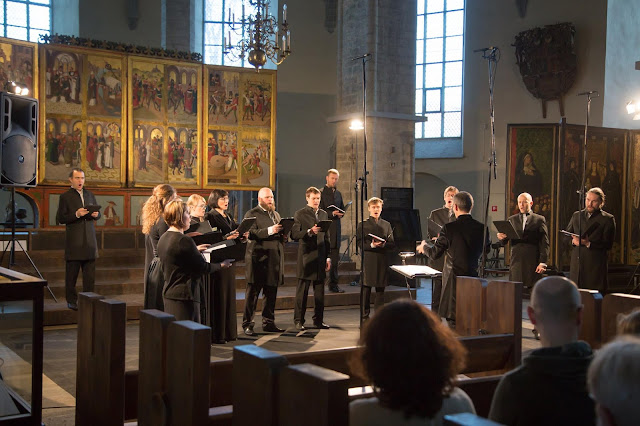 |
| Galina Grigorjeva, Jaan-Eik Tulve, members of Vox Clamantis at Estonian Music Days (Photo Peeter Langovits) |
Reviewed by Robert Hugill on Apr 6 2017
Star rating: 5.0
A stunning start to our Tallinn visit, concentrated intensity in a century of Estonian choral musc
 |
| Helena Tulve at Estonian Music Days (Photo Peeter Langovits) |
The concert's title was Evening Song, and when we arrived in the church four performers, Helena Tulve, Tatjana Kozlova-Johannes, Jandra Puusepp, Kärt Tönisson were providing a gentle introduction, letting us get into the mood of the concert. As they walked round the church, they were producing music on a fine array of pressed glass bowls, the results were completely magical and intriguing. It wasn't an obvious performance (so much so that when entering, I almost collided with Helena Tulve, carrying a glass bowl of water), yet it really drew you in. They led without a pause into Vespers by the Ukraine-born, Estonian-based composer Galina Grigorjeva (born 1962) performed by Vox Clamantis
 |
| Jaan-Eik Tulve and Vox Clamantis at Estonian Music Days (Photo Peeter Langovits) |
Grigorjeva's Vespers is a seven-movement work setting English texts, mainly from the King James bible, though she included the Nunc Dimittis, Grigorjeva's selection of texts also reflected her Orthodox background so we opened with 'Come Let us Worship' and the sixth movement was 'To the Virgin Theotokos'. After the performance, friends in the audience commented that Vespers was rather different to Grigorjeva's recent music (see the recent CD of her choral music Nature Morte). Vespers seemed to conflate a number of fascinating influences including chant (both Gregorian and Orthodox), neo-medieval harmonies and the Georgian polyphonic folk tradition, as if Grigorjeva was mining the different influences and inflections of the words. So we had powerful chords, chant supported by slow moving note-clusters and some magical and often energetic polyphony. A highlight for me was the third movement 'Blessed is the Man' which combined a sequence of solos with spiky harmonies and Georgian folk-style polyphony. The overall impression was a sense of strength, thoughtfulness and a use of silence.
The work was sung in English (speaking to her afterwards, I discovered Grigorjeva had been commissioned to write the piece in English), and it was often fascinating to hear traditional Anglican Evensong words sung to music of such a different tradition. The choir's English was creditable, though some of the English dipthongs and impure vowels escaped them, but this did not detract from a finely confident and technically assured performance.
This was followed by a group of Psalms by Cyrillus Kreek (1889-1962) whose work collecting and harmonising Estonian folk melodies had a profound effect on subsequent generations of Estonian composers. For me, the fascination of Kreek's music partly lies in the detecting of pre-echoes of the music of more recent Estonian composers, though his highly effective and rather luscious arrangements deserve to be better known in their own right. We heard three psalms, No. 121 The Sun will not strike you by day, and No. 141 O Lord, I call to Thee (both from 1923) and By the rivers of Babylon (1944). Kreek's arrangements are relatively conservative, and always showcased the main melody, quite often using unison or a solo line with wordless accompaniment but his choice of harmonies was never conventional and always vibrantly coloured (a colleague heard Delius-like moments in some). The vocal ensemble sang gently but with a quiet confidence which spoke of familiarity and a sense of displaying an essential part of Estonian culture.
Without a break we led into two movements of Arvo Pärt's Kanon Pokajanen, his 1997 setting of the Orthodox Canon of Repentance, sung in Church Slavonic. We heard Ode VI and the final Prayer after the Canon. The work was premiered by the Estonian Philharmonic Chamber Choir (an ensemble around twice the size of Vox Clamantis), and it was impressive how the 14 singers of Vox Clamantis made the piece work, giving us a great sense of intimacy without losing any of the strength. This was a technically assured performance, so that individual voices emerged from the texture and receded as necessary. Pärt's music often has strong technical requirements and it was impressive the way many of the tricky entries were so beautifully and cleanly focused, with fine placing of the harmines. But the performance was enjoyable and moving on so many other levels too.
There was a sense relaxed intensity to the way the singers handled the music. All of Pärt's precise use of voices and silence was there, but with a lovely naturalism which seemed to speak of long familiarity. More than anything else, the singers conveyed that this music really meant something, rather than being simply a challenging collection of musical notes. During the quieter sections there was a terrific use of silence as the harmonies resounded round Nigulste, and then in the climax towards the end of the final movement we had some wonderfully tingling chords.
 |
| An immersive performance, audience members arriving during the sound installation (including your reviewer, Robert) |
There was a very respectful delay after the end of the final music, before the applause (in strong contrast to some London audiences), and the audience was rightly very appreciative and we were treated to an encore, a luscious piece which may have been another by Cyrillus Kreek.











No comments:
Post a Comment